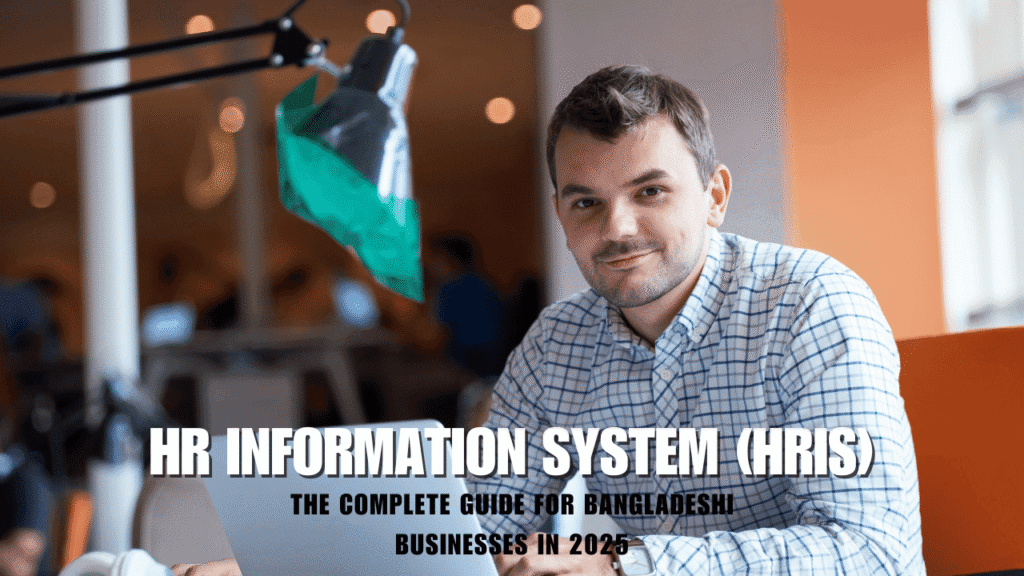In Dhaka’s bustling corporate landscape, HR managers at a leading textile company spend hours every week manually calculating overtime pay for 1,000+ workers. Meanwhile, payroll errors lead to disputes, and employee turnover soars due to slow grievance resolution. Sound familiar?
This is the reality for many Bangladeshi businesses still relying on paper-based HR processes. But what if you could cut administrative costs by 40%, eliminate payroll mistakes, and boost employee satisfaction—all with one tool? Enter the HR Information System (HRIS), a digital revolution reshaping HR in Bangladesh.
What is an HR Information System (HRIS)?
An HR Information System (HRIS) is a software solution that automates and centralizes human resource tasks, from payroll and attendance tracking to recruitment and performance management. It acts as a single source of truth for all employee-related data, replacing scattered Excel sheets, paper files, and repetitive manual work.
For example, Square Pharmaceuticals, one of Bangladesh’s largest companies, adopted an HRIS in 2022. The system automated leave approvals, digitized employee records, and integrated with their existing accounting software. As a result, HR teams reduced time spent on administrative tasks by 35%, allowing them to focus on strategic initiatives like employee wellness programs.
Why Bangladeshi Businesses Need an HRIS in 2024
The challenges faced by HR teams in Bangladesh are unique:
- Manual Processes: Many SMEs still use paper-based attendance registers, leading to errors in overtime calculations (e.g., confusion between daily and monthly wage workers).
- Compliance Risks: Bangladesh’s labor laws are complex, with frequent updates. For instance, the Bangladesh Labor Act (Amendment 2023) introduced stricter rules on maternity leave and overtime pay. Manual tracking often leads to non-compliance and fines.
- Employee Expectations: Younger professionals demand self-service tools. A 2023 survey by BDjobs found that 68% of Bangladeshi employees prefer companies with digital HR systems for transparency and efficiency.
Real Data:
- Companies using HRIS in Bangladesh report 30-50% faster payroll processing (Source: BASIS 2023 Report).
- A Dhaka-based garment factory reduced payroll errors from 15% to 2% after implementing an HRIS, saving ৳8 lakh (BDT) annually in dispute resolutions.
Key Features of an HRIS: Solving Real Problems in Bangladesh
Let’s explore how an HRIS addresses common pain points for Bangladeshi businesses:
1. Automated Payroll Management
Payroll errors are rampant in industries like manufacturing and retail, where workers have variable shifts and overtime. An HRIS auto-calculates salaries, bonuses, and deductions based on attendance data.

Example:
A Chittagong-based apparel exporter with 2,000 workers used to spend ৳2.5 lakh (BDT) monthly on manual payroll processing. After switching to Bkash HRIS (a local solution), they cut costs by 60% and eliminated errors caused by miscalculations.
2. Attendance and Leave Tracking
Bangladeshi companies often struggle with “buddy punching” (employees clocking in for absent colleagues) and unauthorized leave. Modern HRIS platforms use biometric scanners or mobile apps with GPS tracking to ensure accuracy.
Case Study:
A Dhaka IT firm reduced unauthorized leave by 45% after implementing TigerHR (a Bangladeshi HRIS). Employees now request leave via a mobile app, and managers approve/reject requests in real time.
3. Compliance Management
An HRIS auto-updates with changes to local labor laws, tax rates, and compliance requirements. For instance, it ensures proper calculation of Eid bonuses or provident fund contributions, which are mandatory under Bangladeshi law.
4. Recruitment and Onboarding
HR teams can post job openings on multiple platforms (e.g., BDjobs, LinkedIn), screen resumes using AI, and automate offer letters.
Example:
A leading Dhaka bank reduced hiring time from 45 to 20 days by using Oracle HRIS to schedule interviews and collect digital signatures for offer letters.
5. Employee Self-Service (ESS) Portals
ESS portals allow employees to download payslips, update personal information, or apply for loans without HR intervention. This is critical in Bangladesh, where HR teams are often overloaded.
HRIS vs. HRMS vs. HCM: Which One Fits Your Business?
While these terms are often used interchangeably, they serve different purposes:
- HRIS focuses on core HR functions like payroll, attendance, and compliance. Ideal for SMEs in Bangladesh (e.g., retail, manufacturing).
- HRMS (Human Resource Management System) adds workforce management tools like shift scheduling. Useful for industries with shift workers (e.g., hospitals, call centers).
- HCM (Human Capital Management) includes strategic tools like talent development and succession planning. Best for large enterprises (e.g., multinationals in Bangladesh).
Local Example:
Akij Group, a conglomerate in Bangladesh, uses SAP SuccessFactors (HCM) to manage talent across its 30+ subsidiaries. The system identifies high-potential employees and recommends training programs to prepare them for leadership roles.

How to Choose the Right HRIS: A Guide for Bangladeshi Companies
Step 1: Identify Your Needs
Start by auditing your HR workflows. For example, a restaurant chain in Sylhet realized 70% of HR time was spent resolving payroll disputes. They prioritized an HRIS with strong payroll automation.
Step 2: Budget Considerations
Most cloud-based HRIS solutions in Bangladesh cost ৳500–৳1,500 per employee annually. On-premise systems require higher upfront investment (৳5–৳20 lakh) but offer more customization.
Step 3: Local Compliance Support
Choose a system that supports Bangla language and complies with the National Board of Revenue (NBR) tax rules. For instance, Monstar HRIS (a local provider) auto-generates PAYE tax reports in compliance with NBR.
Step 4: Mobile Accessibility
With 85% of Bangladeshis using smartphones, opt for an HRIS with a mobile app. Sheba.xyz, a Dhaka-based HR tech startup, offers a Bangla-language app for factory workers to check payslips and apply for leave.
Top HRIS Solutions for Bangladeshi Businesses
| Software | Best For | Why It Works in Bangladesh | Pricing |
|---|---|---|---|
| TigerHR | SMEs (50–500 employees) | Bangla interface, compliance with labor laws | ৳800/employee/year |
| Monstar HRIS | Manufacturing & Retail | Biometric attendance, overtime calculations | ৳1,200/employee/year |
| Oracle HCM Cloud | Large Enterprises | Global compliance, talent management | Custom quote (starts at ৳20 lakh/year) |
| Sheba.xyz | Startups & SMEs | Affordable mobile app, payroll automation | ৳500/employee/year |
Real-World Success Stories in Bangladesh
Case Study 1: Garment Factory Saves ৳12 Lakh Annually
- Company: A Gazipur-based garment exporter with 3,000 workers.
- Challenge: Payroll errors caused frequent worker strikes.
- Solution: Implemented Monstar HRIS for automated attendance and payroll.
- Result: Errors reduced from 10% to 1%, saving ৳1 lakh monthly in dispute costs.
Case Study 2: Tech Startup Boosts Employee Retention
- Company: A Dhaka fintech startup with 50 employees.
- Challenge: High turnover due to slow grievance resolution.
- Solution: Adopted Sheba.xyz for a self-service portal.
- Result: Employees resolved 80% of queries independently, reducing turnover by 30%.
The Future of HRIS in Bangladesh: AI and Beyond
- Bangla-Language AI Chatbots
Local HRIS providers are developing AI chatbots to answer employee queries in Bangla. For example, Pathao uses a chatbot to handle driver payroll questions. - Mobile-First Solutions
With 4G penetration rising, HRIS platforms are prioritizing mobile apps for factory workers and remote employees. - Integration with Local Payment Systems
Future HRIS tools will auto-disburse salaries via bKash or Nagad, reducing reliance on bank transfers.
An HRIS isn’t just a tool—it’s a strategic investment. For Bangladeshi businesses, it bridges the gap between legacy processes and modern workforce demands. Whether you’re a startup in Uttara or a textile giant in Narayanganj, the right HRIS can transform chaos into clarity.
Closing Quote:
“In a country growing as fast as Bangladesh, HR teams can’t afford to waste time on manual work. An HRIS isn’t a luxury; it’s the key to scaling sustainably and keeping your employees happy.”
— Farhana Rahman, HR Director at ACI Limited

